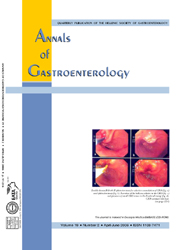Extraintestinal manifestations of Inflammatory Bowel Diseases: Is there effective liver therapy?
Abstract
Hepatobiliary diseases are common in IBD patients, includingprimary sclerosing cholangitis, sclerosing cholangitis
of the small bile ducts, cirrhosis, cholangiocarcinoma, fatty
liver and cholelithiasis. PSC is the most common of these
diseases, with an incidence ranging from 2.5% to 7.5%. It
usually progresses insidiously and finally leads to cirrhosis
independent of inflammatory bowel disease activity. The
probability of cholangiocarcinoma is very high in PSC patients
and the prognosis is dismal. There is an elevated risk
of developing colon cancer in patients with PSC. Medical
therapy has not proven successful in slowing disease progression
or prolonging survival in PSC. Endoscopic therapy
is recommended for treating complications of recurrent
cholangitis or worsening jaundice in cases of dominant
stricture, but these approaches have not been definitely
demonstrated to improve survival or decrease the need for
liver transplantation. Liver transplantation remains the
therapy of choice for patients with advanced liver disease.




